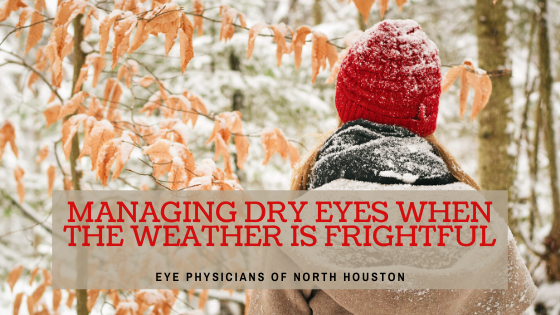There is a lot to love about winter – the scents, holidays, and events. However, the season’s lower humidity is certainly not one of them, especially as it can cause moisture to evaporate at a much faster rate. That can leave you with chapped lips, cracked hands, and dry eyes.
You can use moisturizers and lip balms to reduce any discomfort associated with dry skin, but finding relief for your dry eyes generally requires a different, more sensitive approach. That may be exceptionally accurate if you are one of the estimated sixteen million Americans who are affected by dry eye syndrome (DES).
DES is a condition in which your eyes either make tears in an inadequate number or that do not work correctly. Dry eye syndrome can leave your eyes feeling incredibly uncomfortable and, if left untreated, lead to impaired vision. During the winter, symptoms may be exacerbated, which makes conserving moisture even more essential.
Dry Eye Syndrome Facts
Prevalence: Increases with age, affects twice as many women than men, diagnosed in people between the ages of 18 and 34. DES is also seen more in people who spend a lot of time in front of a screen or wear contact lenses.
Symptoms: Irritated eyes, light sensitivity, impaired vision, and excess watering.
Diagnosis: Requires a comprehensive eye examination by an ophthalmologist.
Treatment: Artificial tears, prescription eye drops/ointments, or surgery.
Tips for Managing Dry Eyes
Add More Tears: Artificial tears, which can be purchased over-the-counter, are eye drops that help moisten dry eyes. The tears should be put in both of your eyes twice a day or, more often, if needed. Preservative-free eye drops are best for sensitive eyes.
Moisturize Indoor Air: Humidifiers release water vapor or steam, depending on the model, into a room to increase the moisture in the air. As such, they can help ease the discomfort associated with dry eyes. For added benefits, consider a model that emits essential oils. Humidifiers should be operated on the lowest setting for maximum results.
Use Warm Compresses: Apply a warm, damp washcloth to your closed eyes for five to ten minutes, then wash your eyelids using a gentle facial cleanser. Doing this once a day, particularly before bed, can help open clogged tear glands (lacrimal glands) and improve the quality of your tears
Direct Heaters Away from Your Face: The downside to staying indoors on a cold winter day is that the heat from your heater can quickly deplete any moisture in the air. To prevent your eyes from drying out, it is a good idea to make sure vents and space heaters are not blowing directly into your face.
Talk with Your Ophthalmologist
Schedule an appointment with an ophthalmologist to discuss the best treatment options for your dry eyes if at-home treatments are not enough, or symptoms persist for longer than a week or two.
Whether you need to schedule an annual, comprehensive eye exam or you require surgical vision correction to treat dry eye syndrome or cataracts, you can always expect to receive high-quality care at Eye Physicians of North Houston.
Contact us today at (281) 893-1760 for more information or to schedule an appointment with one of our ophthalmologists. We are open Monday through Friday, from 8:00 am to 5:00 pm.
Resources:
“Dry Eye.” National Eye Institute (NIH), nei.nih.gov/learn-about-eye-health/eye-conditions-and-diseases/dry-eye.
“Prevalence of Diagnosed Dry Eye Disease in the United States Among Adults Aged 18 and Older.” National Center for Biotechnology Information (NCBI), PubMed, ncbi.nlm.nih.gov/pubmed/28705660.

